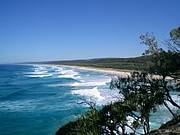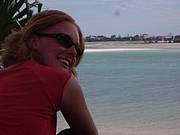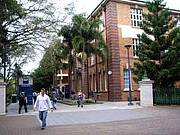Ilka Schmüser at Queensland University of Technology, Australia
Brisbane, Queensland and Australia
Brisbane is the capital of the state of Queensland, Australia.
When thinking about Australia, most people would think of Sydney or Melbourne first, maybe the Sydney Opera House or the Australian Open, the Whitsunday Islands, surfing or the Great Barrier Reef.
“Queensland – the Sunshine State”, that’s what the license plates here say, and they are most definitely right on that one. Hardly any rain or even clouds and winter means 20°C; and yes, after a while 20°C actually seems pretty cold. Sometimes it seems like being on a never-ending summer holiday. Although Brisbane is the only big Australian city that is not situated right at the beach front a short drive will take you to the Gold Coast (south) or the Sunshine Coast (north).
There are several universities in Brisbane and life is extremely student-friendly. Most of the daily life happens outside, in parks, cafés, the former EXPO grounds now turned parks, the Royal Botanical Gardens or the River Front to just mention a few or the popular hang outs. There are free outdoors salsa classes, live music in pretty much every bar or people meet to just watch sports on TV in the Queen Street Mall. All in all, a young and vibrant city, a perfect place to live and study.
But still, why should you want to go to Brisbane instead of Sydney, Australia instead of New Zealand, or even want to sit in a plane for some 20 hours?
To me it has always been a dream to one day visit Australia, so in the end I decided to spend a year at the Queensland University of Technology, Brisbane. No matter that you can hardly get further away from Germany, or the effort it takes organising everything, or that there might be easier ways to spend some time at another institution or do the practical training semester, Australia is definitely worth it to go through all the trouble.
Studying at the Queensland University of Technology
The Queensland University of Technology is a university with about 40.000 enrolled students and was established in 1908. It is one of the largest universities of Australia although you would never think that when walking around campus. The main campus is right in the centre of the city next to the Royal Botanic Gardens, two further campuses are a short drive from the city centre.
The QUT calls itself a “University for the real world” and indeed is more concerned on applied sciences and knowledge rather than theory. That combined with them offering a course in Medical Engineering and their focus on research in that field were the major reasons for my choice to go there.
Studying in Australia is quite a different experience from studying in Germany. For example, it involves a great deal of self-study rather than a lot of attendance hours on campus. Per semester, you only take 3-5 units. That may not sound too much but it will keep you quite occupied come the end of term.
Part of the Study Abroad Program is that you are completely free in choosing whatever you wish to study. The International Office will help with finding suitable units and take care that you do not bite off more than you can chew. Also, there are classes designed especially for incoming international students about topics ranging from business in Australia to history of the indigenous population or colonisation.
There are more than 5000 new international students at QUT every year. They make up a large part of the students and the International Office and the Study Abroad and Exchange Office help ironing out every imaginable difficulty not only when it comes to academics.
Student and social life
Social life and events are mainly organised by various, predominantly sports and cultural, societies and student groups, the Student Guild (a bit like the AStA), the university (eg the Study Abroad and Exchange Office) or simply groups of the many other students you will meet.
There are a lot of activities organised with special regard to new internationals. Through those you will not meet many Australians though. I can only recommend joining societies or sports clubs. Without consciously making an effort it is easy to spend all your time around internationals not interacting a lot with locals.
What you should not miss in any case is for example a trip to Fraser Island, to learn to surf, to scuba dive in a coral reef and visit a Rugby match, preferably when Australia plays the All Blacks or when Queensland is up against New South Wales. South Stradbroke Island, Noosa and Mt. Cootha are must-sees, too.
When it comes to travelling and must-sees not only in the area of Brisbane, the Australian university system seems made for international students. The summer is considered too warm to study and therefore lectures run from March to June and July to the beginning of November with only short breaks in that time.
There is no on-campus accommodation at QUT, but the University Accommodation Office will help making appointments for visiting flats or meeting letting agents. Most students live in shared houses with up to 15 people. It is not necessary to organise a flat before you arrive, in fact there’s a good chance you will find a nicer and cheaper place looking around in person. After 3 to 4 days most people have found something suitable.
The living expenses are comparable to Germany, maybe a bit cheaper than Bonn, not counting travelling. As a student you get discounts on just about everything in Queensland, unfortunately not in other states. Going to the movies for example is about 3€. Public transport is not free for students but entirely reasonable priced. Most students live near enough to walk to university anyway. It took me a bit to get used to driving on the wrong side of the road but a bicycle is also a good thing to have, at least if you’re not too lazy to ride it up and down the hills and bridges. A good place to look for anything someone you’d like to buy second hand would be the web page of the student guild. Also there are lots of charity or second hand stores all over the city but especially in Fortitude Valley.
There are cheap flight companies in Australia, too, the most important ones being jetstar and Virgin Airlines. Other, usually cheaper, ways to get around are trains for short distance and coach services like Greyhound and Coachtrans. When it comes to booking anything there are a lot of web pages comparing offers. It’s very convenient not to have to look up everything yourself but they’re usually more expensive. Car rental are a good idea if you travel with some other people. If you intend to spend some time travelling around the country it might even be a good idea to buy a car and resell it later.
When it comes to food and drink in Brisbane, you can hardly want for anything, as long as you know where to find something which can be the tricky part. But asking around will usually get you somewhere, as will in most other cases, too. You will even find original Bavarian Spekulatius, Pumpernickel or Swedish meat balls.
The language is not really a barrier either. Although the Australian accent may take a bit getting used to, people do not usually mind repeating themselves to help you out. For all academic purposes there is always university staff available on campus to give aid writing assignments or upgrading the language of your work.
When I was first thinking about going abroad it helped me a lot to talk to some friends who had already been there, both to find out what to do, when and in what order and to talk about what it was like. All in all, I’ve had a really good time in Brisbane. I met a lot of interesting and wonderful people that I am still in contact with today. It was a great experience and I’d go back in an instant. If you have the opportunity to go, it is absolutely worth it.
It is also about a lot more than just taking a couple of classes so you can collect some credits for your degree or just about improving your English. I think it in some way makes you a more open-minded and independent person; it broadens one’s mind.
I can only recommend going to Brisbane and to QUT.
If you need any help planning anything or just think about that you maybe, sometime, might also want to go abroad you’re welcome to contact me through Sprachen/Internationales.










